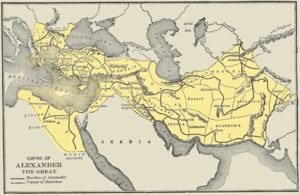- Nearchus
-
Nearchus (Greek: Νέαρχος, Nearchos; c. 360 - 300 BC) was one of the officers, a navarch, in the army of Alexander the Great. His celebrated voyage from India to Susa after Alexander's expedition in India is preserved in Arrian's account, the Indica.
A native of Lato[1] in Crete, his family settled at Amphipolis in Macedonia at some point during Philip II’s reign (we must assume after Philip took the city in 357 BC), at which point Nearchus was probably a young boy. He was almost certainly older than Alexander, as were Ptolemy, Erigyius, and the others of the ‘boyhood friends’[2] ; so depending on when Androtimus came to Macedonia Nearchus was quite possibly born on Crete.
Nearchus, along with Ptolemy, Erigyius and Laomedon, and Harpalus, was one of Alexander’s ‘mentors’ – and he was exiled by Philip as a result of the Pixodarus affair (A 3.6.5; P 10.4). It is not known where the exiles went, but they were recalled only after Philip’s death, on Alexander’s accession.
After their recall, these men were held in the highest honour. Nearchus was appointed as satrap of Lycia and Pamphylia in 334/3 BC (A 3.3.6), one of the earliest of Alexander's satrapal appointments. In 328 BC he was relieved of his post and rejoined Alexander in Bactria, bringing with him reinforcements (A 4.7.2; C 7.10.4, but does not mention Nearchus himself). After the siege of Aornus Nearchus was sent at the head of a reconnaissance mission – especially to find out about elephants (A 4.30.5-6).
In 326 BC, Nearchus was made admiral of the fleet that Alexander had built at the Hydaspes (A 6.2.3; Indica 18.10). However, his trierarchy was a financial responsibility – that is, Nearchus put up the money for the boats (Heckel, p.229); and there were plenty of other trierarchs in the Indus fleet who were not natural born sailors.
During the voyage some of the ships were damaged, and Nearchus was instructed to remain behind to oversee repairs, before continuing down the river. This perhaps indicates some knowledge of shipbuilding, but he could hardly have been the only one qualified.
However, he remained in command of the fleet for the voyage from the Indus to the Persian Gulf, which he recorded in detail (and which was used extensively for Arrian’s Indica). Again, although he was the admiral, in command of the fleet, great seamanship was not required – the naval responsibilities were Onesicritus’. During the voyage, Nearchus was reputedly the first Greek commander to visit Bahrain, which was called Tylos by the Greeks. His visit marked the start of Bahrain's inclusion within the Hellenic world, which culminated in the worship of Zeus (as the Arab sun god, Shams) and Greek being spoken as the language of the upper classes.
After many adventures, Nearchus arrived in Carmania, meeting up with Alexander after the latter’s crossing of the Gedrosian desert. Alexander sent him off to complete his voyage – he went as far as the Euphrates before turning back to rejoin Alexander at Susa, in early 324 BC.
Nearchus married the daughter of Barsine and Mentor (A 7.4.6), and received a crown as recognition of his exertions (A 7.5.6). He then took the fleet up to Babylon, where he gave Alexander the Chaldeans’ warning not to enter the city (P 73.1-2). Nearchus had a place in Alexander’s final plans, as he was to be the admiral of the Arabian invasion fleet; but the plans were cut short by the king’s death.
In the initial arguments over the rule of the empire Nearchus supported Heracles, Alexander’s son by Barsine – the king’s mistress was now his mother-in-law. Once order broke down he joined Antigonus’ camp. His last mention is as an adviser to Demetrius in 313/2 BC (D 19.69.1); what happened after that is not known, although he probably retired to write his history.
Ancient authorities: Arrian, Anabasis Alexandri, vi. 19, 21; vii. 4, 19, 20, 25: Plutarch, Life of Alexander, 10, 68, 75: Strabo, xv. pp. 721, 725; Diodorus Siculus, xvii. 104: Justin, xiii. 4.
References
- ^ Who's who in the Age of Alexander the Great: Prosopography of Alexander's Empire By Waldemar Heckel Page 171 ISBN 1-4051-1210-7
- ^ Heckel, "Marshals" p.228
External links
- Arrian, The Indica translated by E. Iliff Robson.
- Pothos.org:Nearchus by Marcus Pailing
- Livius, Nearchus by Jona Lendering
- The Trierarchs of Nearchus by livius.org
- Nearchus the Cretan and the Foundation of Cretopolis[1]
Categories:- Geographers of Alexander the Great
- Admirals of Alexander the Great
- Hetairoi
- Ancient Greek generals
- Ancient Greeks in Macedon
- Settlers in Amphipolis
- Ancient Cretan generals
- Ancient Greeks in Asia
- Explorers of Asia
- Ancient Greek explorers
- People in the history of Pakistan
- History of Bahrain
- 4th-century BC Greek people
- Satraps of the Alexandrian Empire
- Historians who accompanied Alexander the Great
- 360s BC births
- 300 BC deaths
Wikimedia Foundation. 2010.

